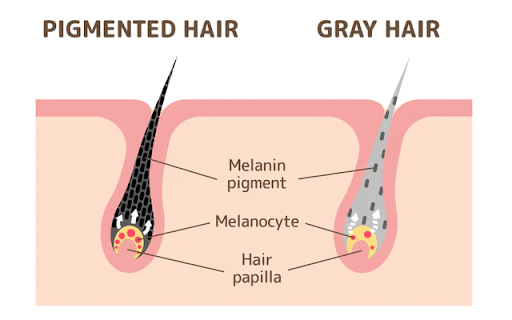Can Vitamins and Supplements Reverse Gray Hair?
Until today there is no scientifically proven medicine to restore the natural hair color when the hair is already gray. However, hair can be protected from premature graying by using food supplements, avoiding stress, or getting rid of bad habits.
In this article, we will review the causes of hair graying, remedies that can reduce gray hair, and innovative technologies that may be used to reverse gray hair in the future.
Why And How Does Hair Turn Gray?
Hair gets its color from a pigment called melanin. There are two types of melanin. The dark one, called eumelanin, causes hair to turn black or brown. The second is a light pigment called pheomelanin, which makes hair red or light. Together, eumelanin and pheomelanin give our hair dark or light hair tones.So how does this pigment get into our hair? It depends on the hair follicle. Each follicle is made up of cells called melanocytes, which produce melanin. As the hair grows, the melanocytes inject melanin into the hair protein called keratin. This protein is naturally colorless, so melanin is the main factor that gives hair its luster and color.
Hair color is highly dependent on genetics, but also various factors reduce the activity of pigment cells, resulting in less melanin production. So, the hair color becomes less pigmented and appears lighter, or when the hair follicles stop producing pigment altogether, the hair turns gray. Each hair follicle produces melanin differently and has a different amount of pigment, which is why hair turns gray individually. Here are the causes of gray hair.
1. Age
Gray hair is one of the most noticeable signs of aging. Gray hair may make
a person look older, and although this is a natural change, not everyone
willingly admits it, so they dye it or look for different ways to hide gray
hair. As we age, our body faces various harmful factors such as air pollution, unhealthy habits, and stress. All these
factors also affect our hair. It is worth noting that the genetic factor
should also be considered.
2. Genetics
We, most often, have a strong resemblance to our parents because we inherit their genes. Hence, it is not surprising that we may start balding or graying at the same time as our parents.Geneticists analyzed more than 6,000 people and found specific genes responsible for baldness, thick beard, or curly hair. But the one that attracted the most interest was a specific variant of the IRF4 gene, which controls another gene called Tyrosinase (TYR). TYR is an enzyme that is required for melanin production. So, this gene determines when the hair will turn gray.
3. Psychological Stress
There are several ways that psychological stress can affect our hair. The best-studied stress-related disorder is telogen effluvium. This is a scalp disorder where a person starts getting bald even 3 times faster than usual due to stress. This disorder resolves within 3-6 months without additional treatment.What about stress and gray hair?
The idea that stress can cause gray hair is a long-held belief, but it has never been scientifically proven. However, a study published in 2020 investigated the multiple pathways of stress-induced graying.
The sympathetic nervous system prepares our body for stressful or dangerous situations, increases heart rate, and blood flow in organs that are needed to get out of danger (legs or arms). The study scientists found that the sympathetic nervous system plays a critical role in stress-induced graying.
It is worth noting that the above-mentioned study was conducted on mice and this experiment has not been confirmed on humans. Nevertheless, this study demonstrates that stress has a profound effect on the body and its processes.
4. Vitamin Deficiency
Hair health also depends on your food and the vitamins you get from it. If you notice premature graying of your hair when it is not justified genetically or you are not under stress, the cause of your graying may be a vitamin deficiency. Several vitamins are essential for healthy hair and pigment production and could prevent premature gray hair.
Copper (Cu)
As mentioned earlier, the TYR enzyme in the production of melanin gives our hair color. This enzyme can be found in various mushrooms. The TYR enzyme also contains Cu and is essential for proper melanin production. Thus, a lack of this enzyme or Cu can cause melanin production disorders, which can lead to graying of hair. To avoid this, you need to include mushrooms and foods that are enriched with copper such as organ meats, shellfish, fish, nuts, seeds, and chocolate in your diet.
Vitamin B12
Hair follicle cells are considered rapidly dividing cells. The process of division is highly dependent on DNA production. The cell needs to duplicate its entire DNA before division. DNA synthesis directly depends on the amount of vitamin B12 and it is one of the main ingredients ensuring DNA synthesis.
A 2016 study looked at vitamin B12 levels in the blood serum of people with premature graying of hair. Results show that vitamin B12 levels were significantly lower in patients with gray hair. To maintain vitamin B12 levels in the body it is necessary to include beef, liver, chicken, milk, yogurt, cheese, and eggs in your diet. To withstand vitamin B12 deficiency, vitamin B12 supplements use is also important.
Folic Acid (Vitamin B9)
Like vitamin B12, folic acid is involved in DNA synthesis. B9 deficiency can inhibit DNA synthesis in follicle cells just as much as vitamin B12 deficiency. Although the results are not as pronounced as with vitamin B12, statistical analysis showed that the premature graying group had lower levels of vitamin B9 than the control group.
You can get this vitamin by eating seafood, eggs, sunflower seeds, or dark green salads like spinach, asparagus, or broccoli.
Niacin (Vitamin B3)
Niacin is another compound that can delay gray hair. Vitamin B3 stimulates blood circulation in the scalp, as a result, more oxygen and substances enter the hair follicles with the blood. Taking this vitamin will make your hair healthier, and thicker and retain its natural hair color longer.
The main source of niacin is red meat such as beef, beef liver, or pork but also nuts, seeds, and bananas are good sources of vitamin B3.
Biotin (Vitamin B7)
Biotin, like other B vitamins, is involved in hair growth. This vitamin is
one of the most important vitamins in maintaining the quality of hair
because it is converted in our body into a protein called keratin. Keratin
is the main component of hair and nails.
Keratin deficiency can manifest itself in weak, thin, and brittle hair. In
rare cases, it can also cause baldness. Many foods contain biotin including
organ meats, eggs, fish, meat, seeds, nuts, and certain vegetables.
Vitamin E
Vitamin E is a fat-soluble vitamin that not only contributes to eye and skin health but also has antioxidant properties. The environment around us, psychological stress, and other factors trigger free radicals formation. A large amount of free radicals in the body causes oxidative stress and can harm our bodies.
Vitamin E can help reduce the presence of these reactive forms in our body, as well as delay the appearance of gray hair. Vitamin E is mostly found in plant-based foods such as plant-based oils, nuts, vegetables, fruits, or seeds.
Melanin is Impaired with Oxidative Stress
How To Reverse Gray Hair?
Unfortunately, to this day, no supplement or drug was shown to reverse gray hair. However, scientific evidence indicates that in the future effective means will be invented. Nowadays, some approaches already show promising results.Stem Cell Therapy
Stem cells are the body’s raw material also called embryonic cells. Scientists discover that stem cells can develop into specific cells (skin, muscle, heart, etc.) when inserted into body tissue or organ. The use of stem cells in the treatment of disorders is called “Stem cell therapy”.
Research on stem cell therapy is gaining momentum. Currently, stem cells are used only in the treatment of leukemia or lymphoma. Yet, researchers are exploring the possibility of using stem cell therapy for diseases such as neurodegenerative diseases, diabetes, or heart disease. Hair regrowth or recoloring is no exception.
As we age, the follicular stem cell reservoir depletes. As a result, new hair follicles and pigment-producing cells are no longer regenerated. Thus, we lose hair and hair color. With stem cell transplantation, it would be possible to refill the follicular stem cell reservoirs, thus ensuring new hair growth and the presence of color.
IRF4 Gene Regulation
It is no secret that our appearance is determined by genes and their activity. As we age, gene activity changes, and for this reason, our appearance is also constantly changing. Scientists are identifying more and more genes that are responsible for health disorders or changes in appearance. More recently, a gene and its variant have been discovered that is involved in gray hair development.
The IRF4 gene is a master regulator of pigment production. Studies have shown that a decrease in the expression of this gene strongly contributes to the loss of pigment in the hair. Creating a medicinal product that would stimulate this expression would not only stop it but may also potentially restore the hair’s natural color.
How Else Can You Prevent Gray Hair?
Quit Smoking
Smoking can lead to gray hair. In a 2013 study, researchers discovered a strong link between premature gray hair and smoking. The study compared groups of smokers and non-smokers up to the age of 30. A comparative analysis showed that smokers are two and a half times more likely to develop premature graying of hair. It has been indicated that smoking is associated with generating a huge amount of reactive oxygen forms leading to increased oxidative stress.
Chemicals And Sunlight
The environment and the chemicals it contains stress our bodies. It also affects the health of our scalp and follicles.
For example, the chemicals we use every day as shampoos, and hair styling products irritate our scalp, which can lead to dandruff. This is a sign that our scalp is under stress. This stress can lead not only to premature graying of hair but also to baldness. By washing the head less often or using natural remedies, we can reduce the stress on our scalp.
Like chemicals, solar radiation also irritates our skin. A lot of sunlight dries out our hair and scalp, which can also affect the quality of our hair. The easiest way to protect yourself from the rays is to wear a head covering.
Supplements
The supplements are a good way to maintain the right amount of elements in our body. Supplements not only give us energy, support our psychological state, and can stop aging, but they can also support the health of our hair.
By using supplements such as biotin, keratin, or group B vitamins, we can strengthen the hair, these vitamins make the hair stronger, thicker, and grow faster. Taking supplements, we also stimulate the cells in the follicle that are responsible for the pigment, so the supplements can partially stop or at least delay the premature graying of the hair.
It is worth noting that NAD+ precursors NMN or NR increase NAD+ levels in cells. These supplements could also be potential compounds to boost cellular energy production and thus delay follicle depletion and also prevent hair from graying. But more research is needed to prove its effectiveness.
Conclusion
With the means that can reverse gray hair, we still have to wait. To date, there is no effective method to do this. But we can delay or prevent gray hair by taking care of ourselves. Eating more healthy foods rich in antioxidants and vitamins, taking supplements that contain essential components for healthy hair growth, as well as reducing stress in your daily life and living a healthy lifestyle, quitting smoking, and exercising more.
Reposted from: https://hello100.com/vitamins-and-supplements-for-gray-hair-reversal/
Related: Best Shampoos for Gray Hair





.png)

.png)
.png)


Comments
Post a Comment